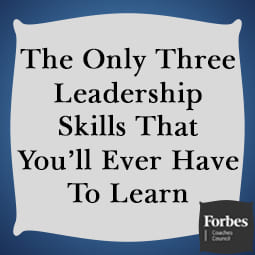Read this article on Forbes.com!
Do you ever wonder why some people make it to the top despite the same upbringing and education?
As a leadership expert and business consultant, I’ve traveled around the world meeting and working with politicians, celebrities and CEOs from various walks of life. Almost every single one of them stated that to get to the top, it wasn’t a brilliant stroke of genius. It wasn’t a series of lucky breaks after downturns and crumbling falls. It wasn’t the right connections that landed them the next big role. Instead, it was an inner knowing or trust that helped them build their career. The majority of these top performers learned how to trust their intuition. Besides trusting their gut, these top performers also mastered people and time management skills.
First, how do you learn to trust your intuition?
Inspired by the Russian language, I’ve come up with an idea that describes the three general types of people: Ot, K and Mezdu. I often ask clients a series of questions for them to help them discover their default gut reaction.
Ask yourself, if it were 1490 and Christopher Columbus came up to you asking you to go sailing out yonder, what would your honest answer be?
The Ot type would say, “No way. The world is flat. I’d be sailing to my death.”
The K type would reply, “Yes, I’m in! I heard the world is flat, but I don’t believe it. I’m ready to discover what’s out there!”
Mezhdu might answer, “Maybe? Let me ask somebody else if it’s a good idea to go.”
To think about these personality types in another way, we can call them the Negative Nelly (Ot), the Overly Optimist (K), and the Maybe Mighter (Mezhdu).
Both the Negative Nelly and the Overly Optimist are normally self-referencing. The Maybe Mighter, on the other hand, is still seeking an outside reference or someone to help them make a decision to do the next thing. There’s something I call “Pareto’s principle refashioned.” This is when you have to make a decision with only 20% of the information, not knowing what the other 80% is. We all need counsel sometimes when we are making important decisions, but when we can’t get it, we must push beyond our comfort zone and take a chance on our gut. The Maybe Mighter naturally has the most trouble with this, but the other two types also experience their own challenges.
Which of these do you tend to identify with most? Once you know what your usual gut reaction is, here’s how you can use this information to help you make better decisions:
1. If you are an Ot type, you might say no first. While it’s what has worked for you in the past, know that the world is indeed round, not flat. Things are not always as they appear. Look for new information and possibilities before you ixnay others ideas.
2. If you are a K type, you love to say yes, yes, yes. Without focus, it can cause time and people management debacles as you are stretched thin. Before you emphatically jump “all in,” think through factors such as budget, time and process before you go on your next adventure.
Both the Negative Nelly and the Overly Optimist are normally self-referencing. The Maybe Mighter, on the other hand, is still seeking an outside reference or someone to help them make a decision to do the next thing. There’s something I call “Pareto’s principle refashioned.” This is when you have to make a decision with only 20% of the information, not knowing what the other 80% is. We all need counsel sometimes when we are making important decisions, but when we can’t get it, we must push beyond our comfort zone and take a chance on our gut. The Maybe Mighter naturally has the most trouble with this, but the other two types also experience their own challenges.
Which of these do you tend to identify with most? Once you know what your usual gut reaction is, here’s how you can use this information to help you make better decisions:
1. If you are an Ot type, you might say no first. While it’s what has worked for you in the past, know that the world is indeed round, not flat. Things are not always as they appear. Look for new information and possibilities before you ixnay others ideas.
2. If you are a K type, you love to say yes, yes, yes. Without focus, it can cause time and people management debacles as you are stretched thin. Before you emphatically jump “all in,” think through factors such as budget, time and process before you go on your next adventure.
3. If you are Mezdu, you are usually stuck in the middle. As the swing voter, you might have become the voice of reason or the march of delay. Next time, stop asking everyone and their mom, what they think. Listen to yourself, state your opinion, and move on. The world will keep on spinning.
Armed with these answers, you can understand your baseline and leverage your intuitive response.
Besides identifying what their default reaction is, my clients who reach the top apex of their career goals also factor in these top two leadership skills: time and people management.
Studying what some believe is one of the top 25 leadership books of all times, Sun Tzu’s Art of War, I realized that what holds true in the past is still relevant for our present day. As Tzu elaborates, both people and time management are crucial parts of reaching your career goals, no matter what those goals are.
Although an MBA from a top 10 school is still priceless, it can’t teach you the three most important skills that you’ll ever need to learn: intuition, time management and people management.
How do you acquire these? Through experience and knowing how your own personality works.


